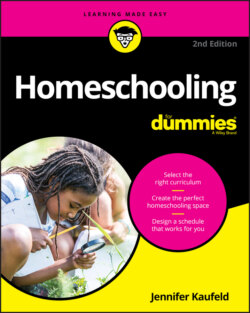Читать книгу Homeschooling For Dummies - Jennifer Kaufeld - Страница 47
Locating Your State’s Law
ОглавлениеAlthough you probably don’t need to camp outside the front door of the state legislature building, having a working knowledge of the law as it applies to homeschooling is always a good idea. First of all, a thorough knowledge of the law and how it applies to you reduces your panic quotient. If you know without hesitation, for example, that your state requires 172 school days per year, the occasional flake that insists that homeschoolers need to teach 200 days won’t faze you at all.
Now that you know you need a copy of your state requirements, where do you find it? Short of calling your local department of education (which may or may not be a good idea depending on where you live), you have a couple solid resources available to you. You can contact your state homeschool association, or you can locate a copy online.
Some educational systems are still leery of homeschooling mostly because they see it as a threat. Local officials sometimes have little idea what the state law actually says and cause trouble without meaning to by requesting information or forms that they have no right to request. At the state level, most of the educators have a better idea of how homeschooling works and how it benefits the educational system as a whole. (For example, homeschooling tends to remove the “problem kids,” such as the gifted, ADD, and unique learners, and leaves the students that the schools were actually designed to teach.)
You can obtain a copy of your state law through your state homeschool association. (For a list of homeschool organizations by state, see Appendix B.) This is one of the services that all statewide organizations offer, and in some cases, it’s one of the main reasons the organization was formed in the first place. If the organization sends you a copy of the law, and you find it incomprehensible (because, like all laws, it will probably be written in law-speak), call them again. Most organizations take the time to explain the law to new homeschoolers, publish a what-this-law-means brochure, or keep a list of veteran homeschoolers from your state who volunteer to answer questions, such as, “What in the world is this trying to tell me?” Finding a copy of your state law online is quick and painless — that is, unless your cable system decides to reset the routers in the middle of your search. In that case, your cable modem goes down, the web browser poofs into nothingness, and there’s nothing left to do but start the kids on an art project while you wait for the cable connection to resume.
After you get back online, you can locate your state law in one of these ways:
Hop over to your state homeschool organization website. If the organization has a website, and most of them do, you’ll find it in Appendix B of this book.Look for a link on the main page that leads to legal information, state homeschooling law, or the like. The link usually leads to a copy of the law on the website itself. Then you can either read it or print it out. Maybe the link leads to an Adobe Acrobat file (named something.pdf), which you can then save to your hard drive for later reading.
See the state homeschooling legislation information at the Coalition for Responsible Home Education website: (
www.responsiblehomeschooling.org). Find your state in the table of links and click it to open the information that pertains to you.One of the great things about this site is that it links you to your state law as it is actually written. All the laws that pertain to your state are listed by their statute numbers (Nev. Rev. Stat. 392.700 for example, if you live in Nevada). You’ll also see an overview of the important parts of your law in the large Homeschool Statute block of text on each state’s page.
If you live in Canada or are considering moving there, you may want to check out the provincial laws listing at the Canadian Home Based Learning Resource Page (www.homebasedlearning.ca). Much like the United States, Canadian homeschoolers fall under the homeschool laws governing each individual province.
